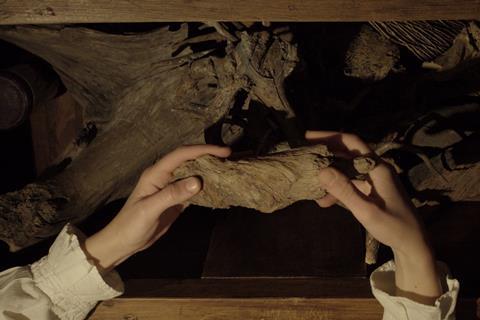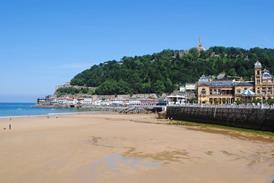Doclisboa winner is a personal exploration of the relationship between the body and the earth

Dir/scr: Sofia Peypoch. Mexico. 2023. 69mins
The earth is the custodian of history’s secrets. Nourished by blood, bone, bark and decomposing flesh, it is a constantly evolving connection to the past. Earth Altars finds visual artist and filmmaker Sofia Peypoch revisiting a traumatic incident to explore the notion of soil as a living palimpsest. It is a sketchy, intensely personal documentary and winning the Best Film award in Doclisboa’d international competition could possibly help place it on the radar of more adventurous festivals. Peyboch was also awarded the festival’s New Talent Award.
Successfully mixes personal history and intriguing existential questions
Peypoch, who has previously made short films including En la penumbra alguien espera un dia luminoso (2019) and At Her Heels A Stone (2020), waits until about a quarter of the way into Earth Altars before informing us that, in the twilight hours of one June evening, she was kidnapped by five armed men on a Mexican highway. She never saw their faces. Now she has returned to the scene of their crime; it is a revisiting but also a reckoning. We learn few further details of what happened that day or how she survived.
This is far from a true life crime recreation or a whodunnit. The focus instead is very much on Peypoch’s vivid exploration of the lasting psychological impact it had on her. She is seen very briefly in the film but she talks of lying face down in the dark, subject to the blows of her captors. She felt that her blood would seep into the soil and her body would sink into the ground. That prompts further poetic musings on what lies beneath, and how she might have become just one more component in the layering of the soil.
The film begins in the pitch dark and the pelting rain. Armed with a camera and a flashlight, Peypoch walks in the woods. She is then seen using her bare hands, frantically digging in the damp earth. Later, we witness the network of gnarly tree roots, fungi, slugs and insects that have been exposed to view. Illuminated only by the beam of torchlight, the wild black night and handheld camerawork combine to make it hard to get a focus on events. Peyboch’s vocal narration and on-screen written words fill in the emotions of someone who once lay helpless on this very ground, fearing that her neck may be pierced by the heat of a bullet.
The focus expands as the film unfolds. Peyboch meets with two forensic pathologists (whose profession is only identified in the closing credits) to discuss human remains, whether fear manifests itself in bones or if bones contain any evidence of change. Kidnappers try to make bones disappear so it is impossible to identify their victims. Later, Peyboch handles a family treasure trove with the tenderness that others might reserve for a collection of prized jewels. Collected over years her treasures are tree bark, bones and the spidery, paper-thin remains of a cactus that has decomposed.
Everything that Peyboch questions or confronts connects back to the legacy of her ordeal. Survival has inevitably left her questioning her existence and her place in the world. It has brought into focus the sense that we are all just flesh and bone, destined to die and disappear. A constant earth holds the comforting promise that the faintest traces of our existence might remain. Earth Altars leaves the impression that there is a lot more to say on the subject and that Peyboch hasn’t managed to entirely illuminate everything that resulted from her kidnapping. It is still a film that successfully mixes personal history and intriguing existential questions.
Production company / International sales: CCC Centro de Capacitacion Cinematografica divulgacion@elccc.com.mx
Producers: Sofia Peypoch, Alejandro Soto Carreno
Cinematography: Sofia Peypoch
Editing: Sofia Peypoch, Clemente Castor
















![[L-R]: Amanda Villavieja, Laia Casanovas, Yasmina Praderas](https://d1nslcd7m2225b.cloudfront.net/Pictures/274x183/6/4/1/1471641_pxl_20251224_103354743_618426_crop.jpg)







